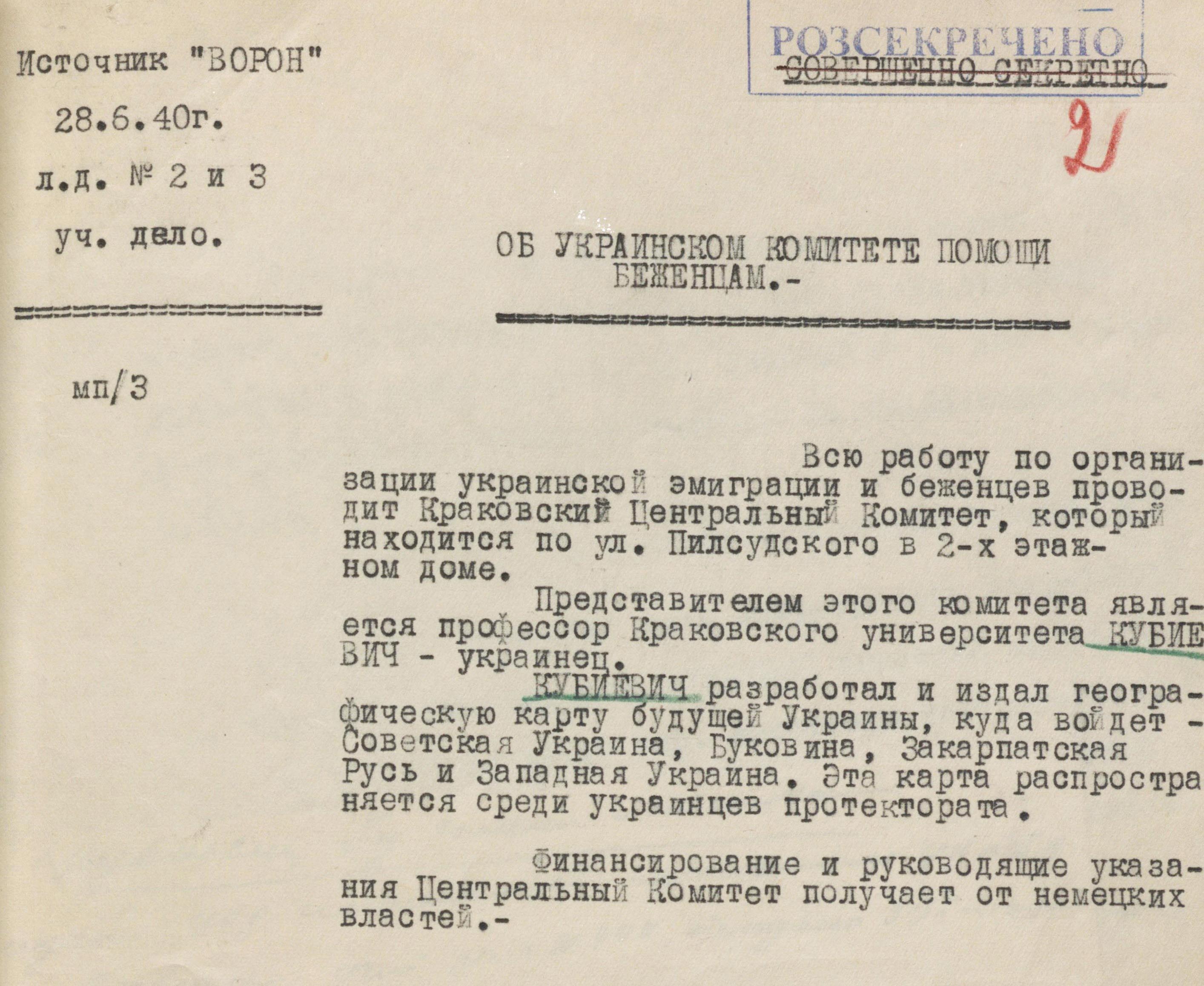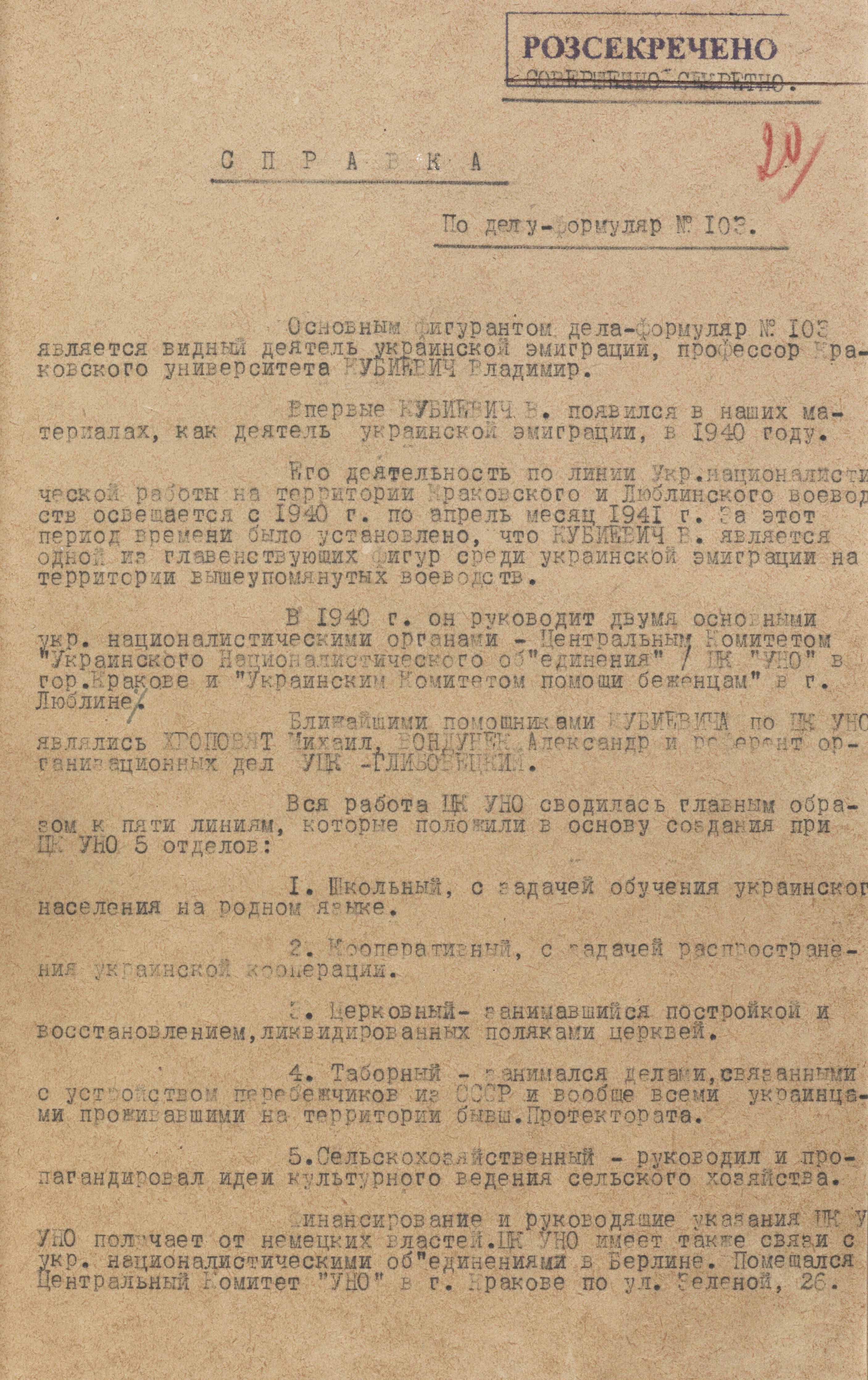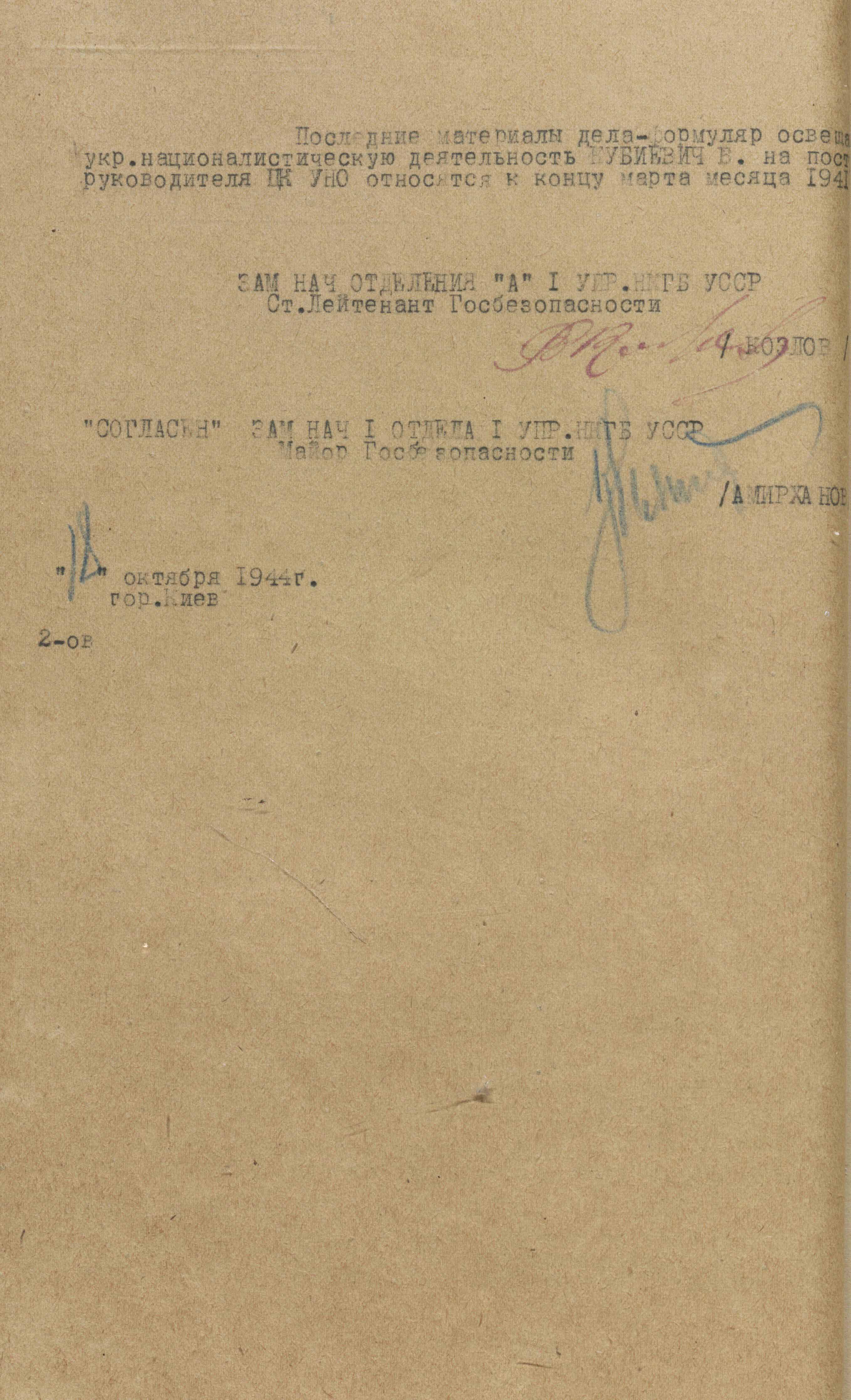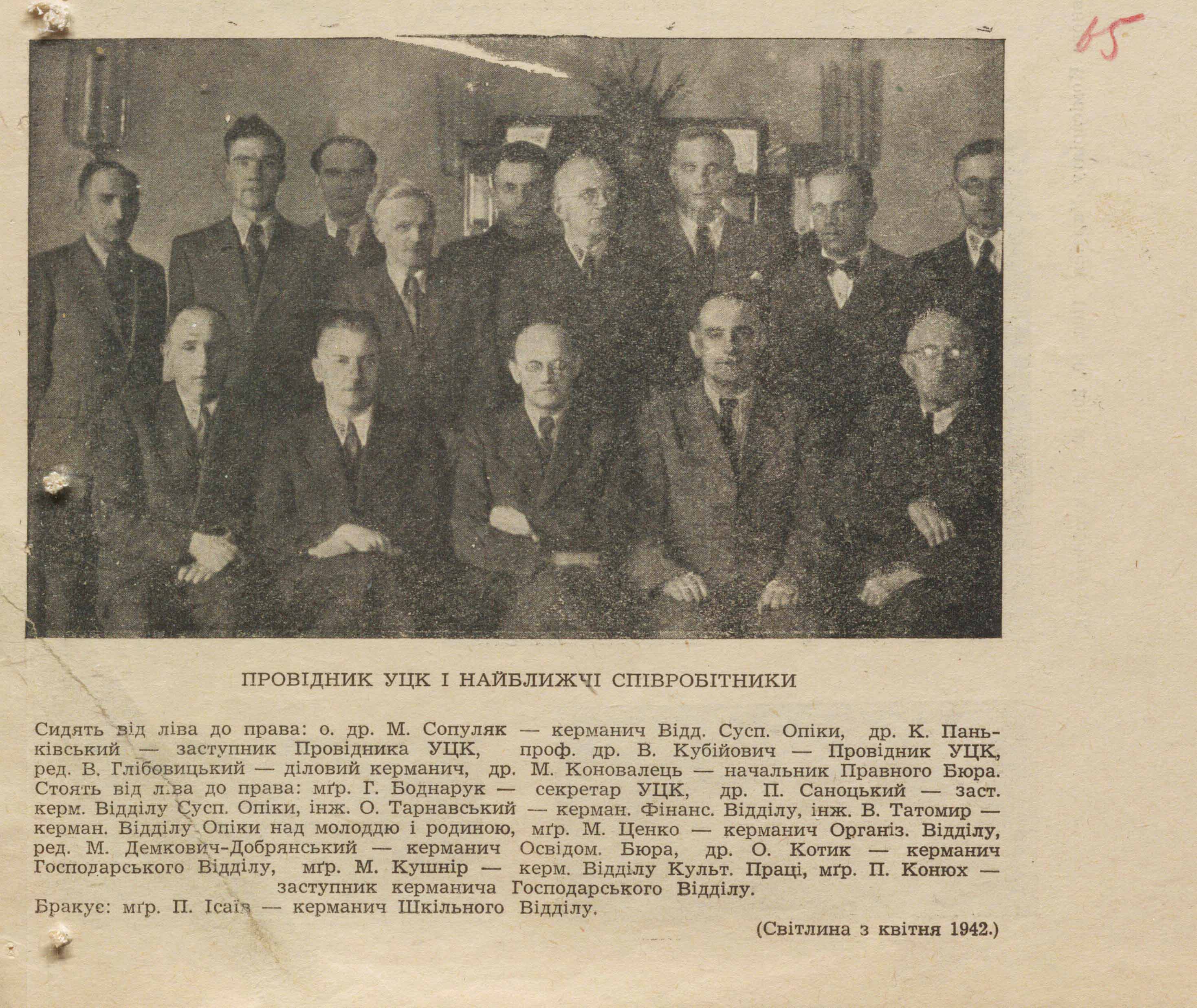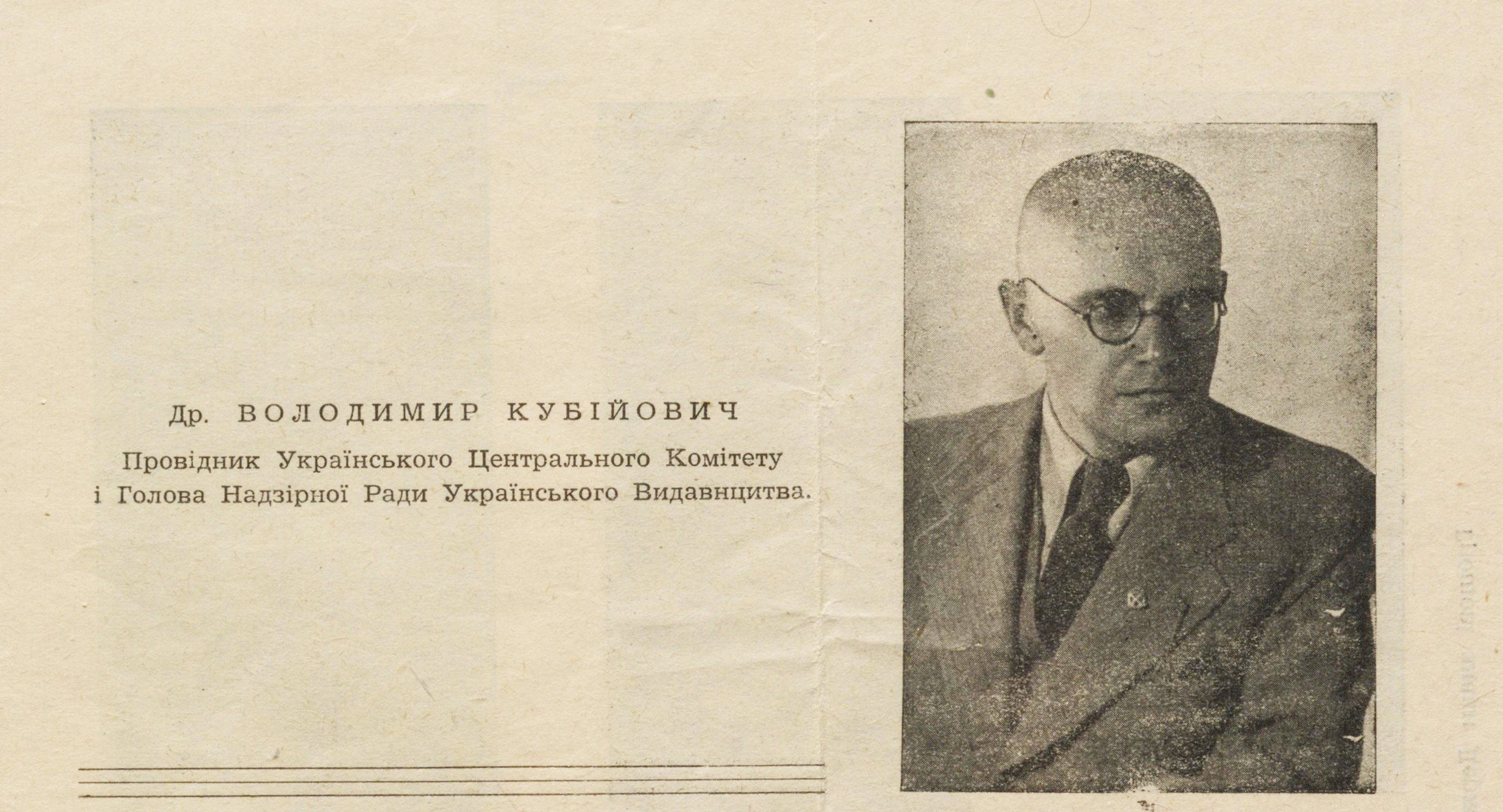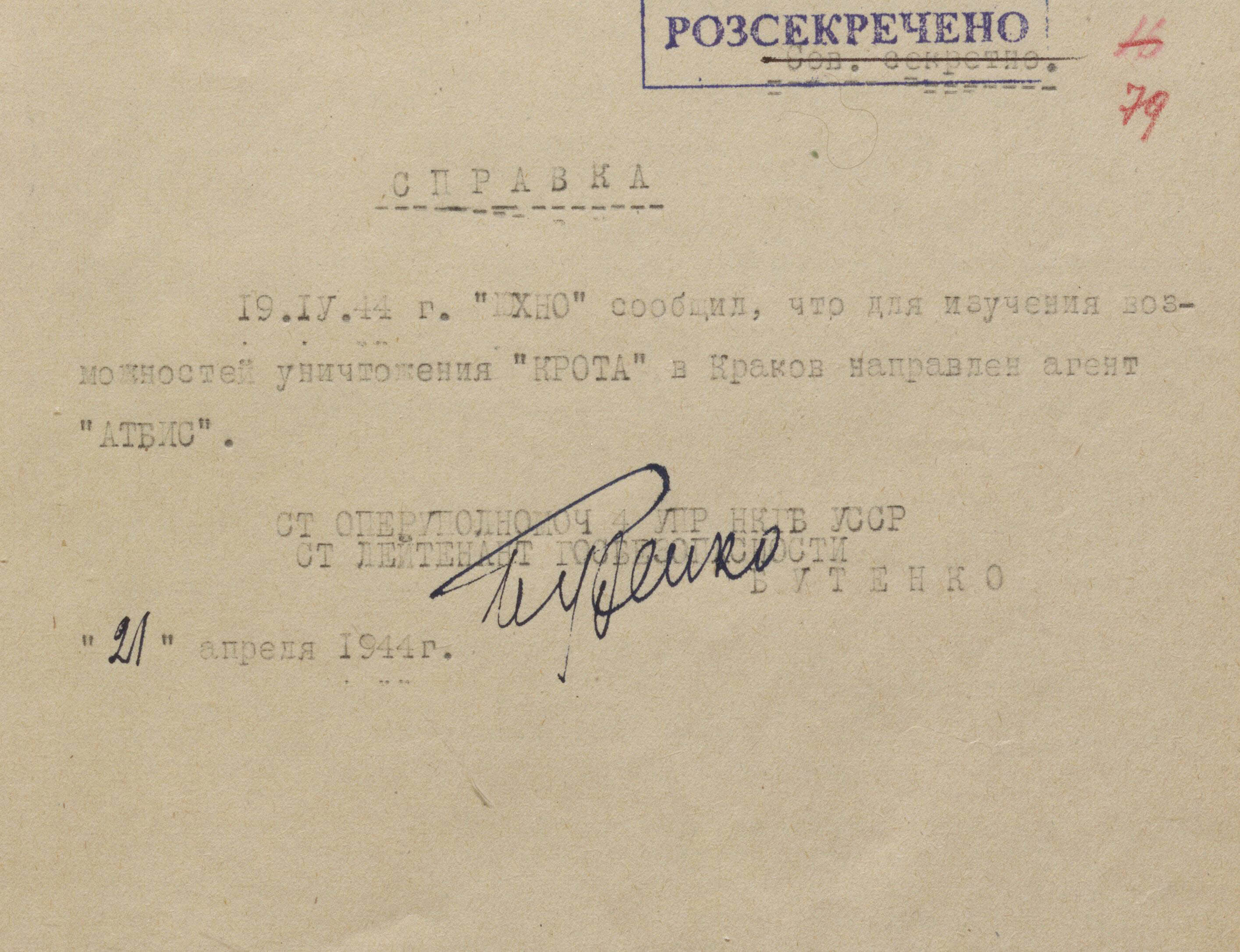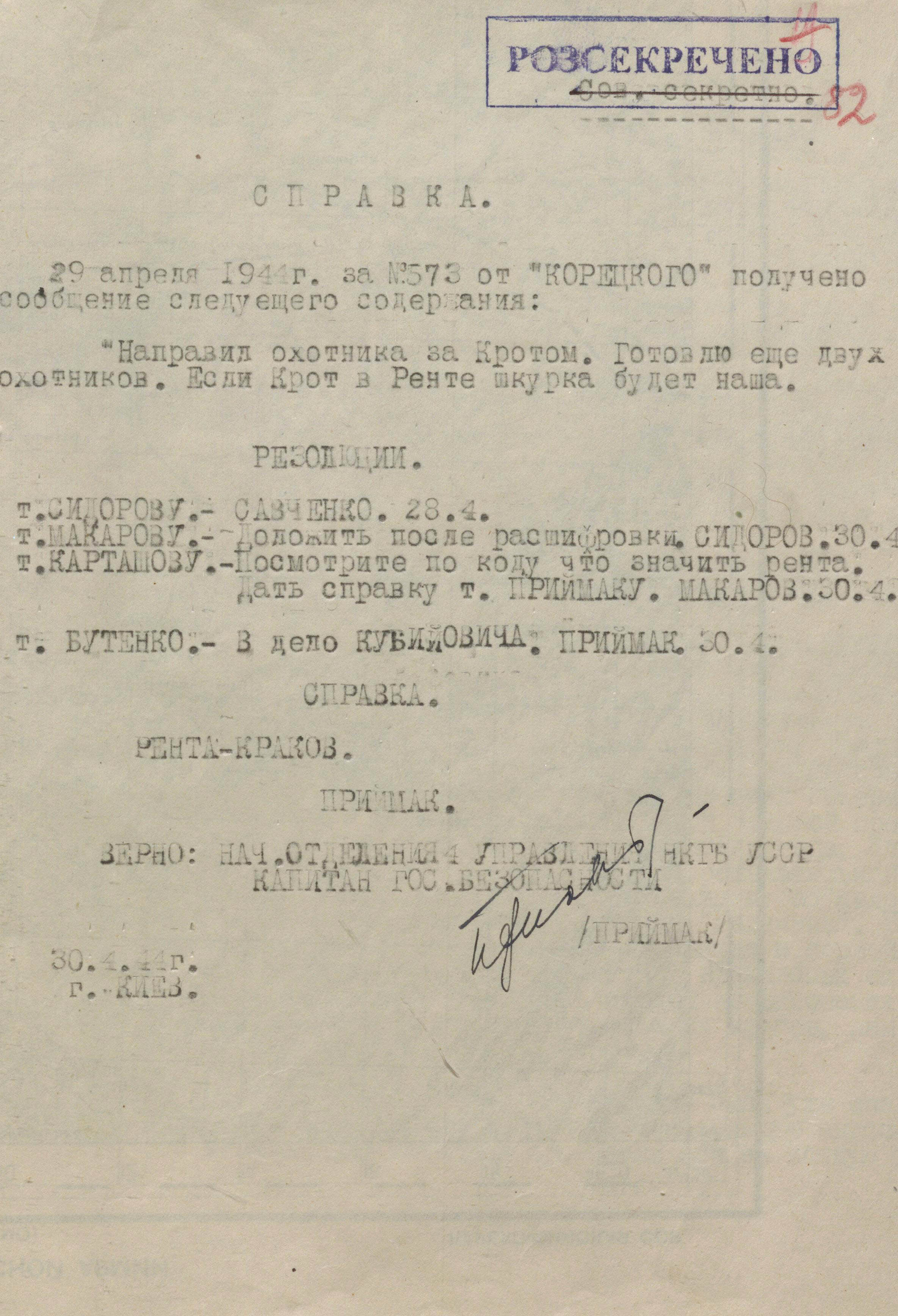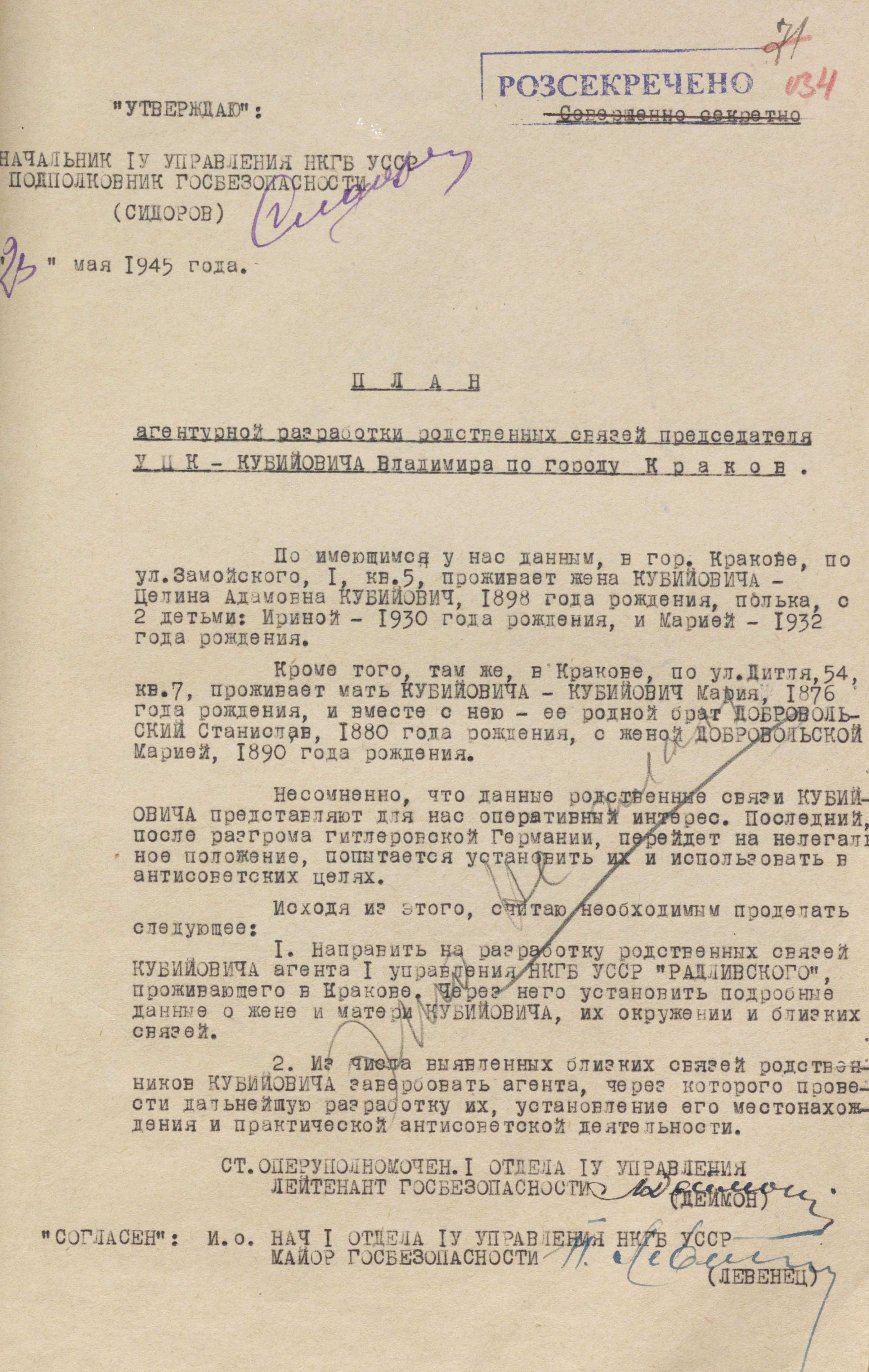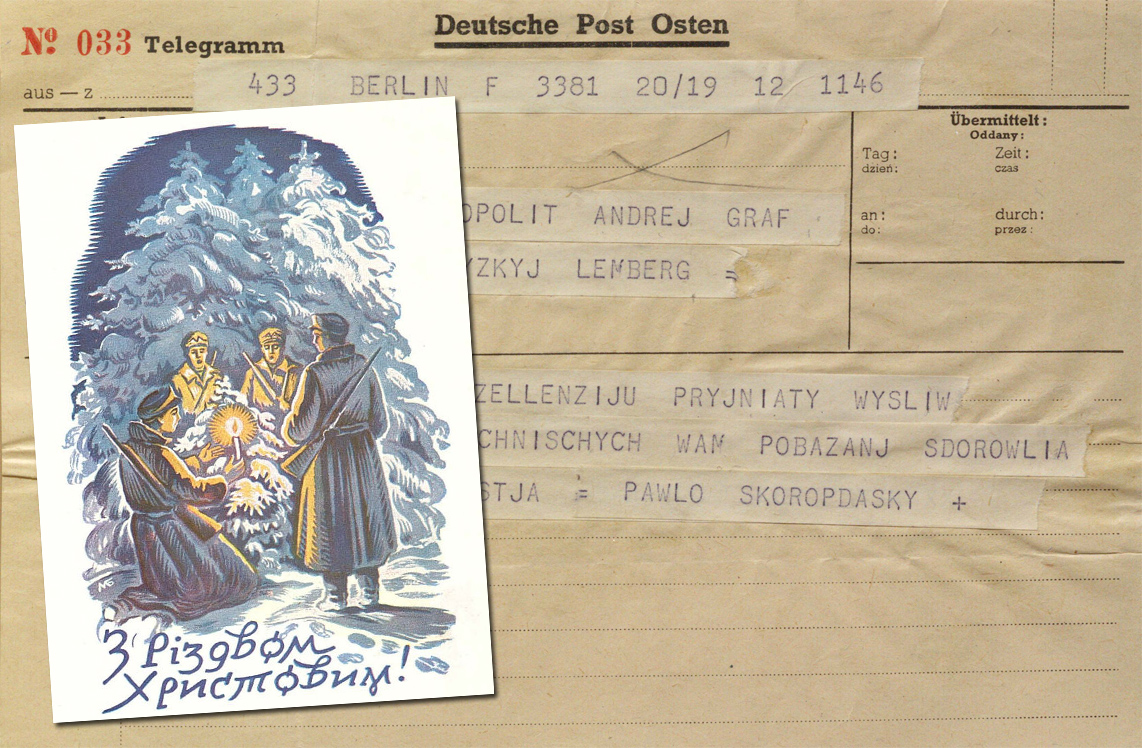Volodymyr Kubiyovych. Everything Is at Stake...
9/24/2024
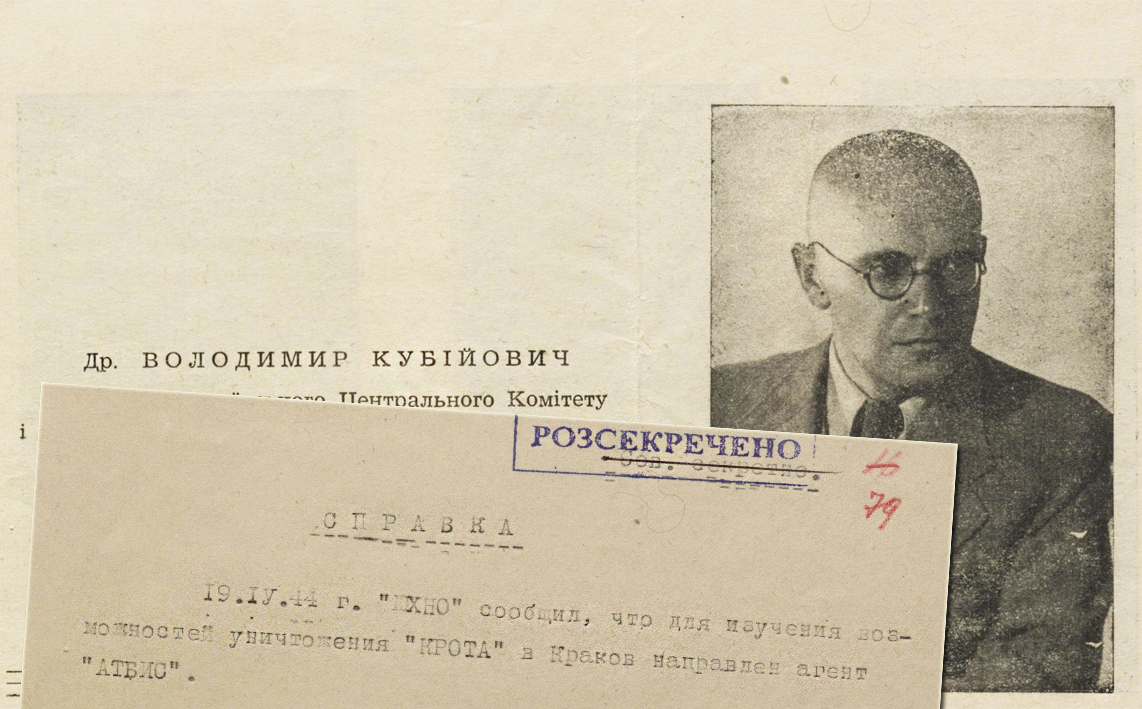
The fact that Volodymyr Kubiyovych, a prominent Ukrainian geographer, encyclopedist, and public and political figure, was subject to Yaroslav Halan's scathing, incriminating pamphlets already indicates the nkvd/mgb’s special attention to him as an ardent “Ukrainian bourgeois nationalist”. But not only pamphlets and articles in “Radianska Ukraina”, “Visti z Ukrainy”, and other newspapers were the main tools of soviet special services and communist propaganda against the Ukrainian scholar. The archives of the Foreign Intelligence Service of Ukraine have unique, hitherto unknown documents showing that an agent operation was being prepared in the bowels of the 4th (intelligence and sabotage) Directorate of the nkgb of the ussr, headed by Pavlo Sudoplatov, to eliminate Kubiyovych.
V. Kubiyovych came to the attention of the nkvd in June 1940. There was no detailed biographical information about him yet. Even the fact that he was born into a Ukrainian-Polish family on September 23, 1900, in Novyi Sonch in the Western Lemkivshchyna (now the city of Nowy Sącz, Poland) was learned much later. At the same time, the very first intelligence report was the basis for labeling him a “prominent Ukrainian nationalist”. It informed that he was a professor at the University of Krakow, a Ukrainian, and that he “developed and published a geographical map of the future Ukraine, which would include soviet Ukraine, Bukovyna, Transcarpathian Rus, and Western Ukraine”.
It was pointed out that the map was in great demand among Ukrainians. And everything related to Ukraine's independence, research on its history, ethnic borders, and especially the visual embodiment of Ukrainians' aspirations to restore their own statehood in the form of a map with borders and their justification was a serious blasphemy and a manifestation of counterrevolutionary anti-soviet views.
Had the chekists dug deeper, they would have found out that as early as 1934, after his report at the International Geographical Congress in Warsaw, Kubiyovych distributed ethnographic maps of Ukraine to all those present. The maps showed that almost a quarter of Poland at that time was inhabited by Ukrainians. In 1937, he prepared an edition of the “Atlas Ukrainy i sumezhnyh kraiv” (“Atlas of Ukraine and Adjoining Countries”), and in 1938 – “Geografia ukrainskykh i sumezhnykh zemel” (“Geography of Ukrainian and Adjacent Lands”).
At that time Kubiyovych was already recognized as an outstanding geographer. In particular, he was deeply involved in the study of Ukrainian ethnic lands within Poland, Czechoslovakia, and Romania. In his research, he consistently defended Ukrainian geopolitical interests and engaged in scientific discussions with Polish scholars, whom he accused of deliberately falsifying facts in their works. For this, in June 1939, V. Kubiyovych, an Associate Professor at the Jagiellonian University in Krakow, was deprived of the right to teach at the institution, where he had once studied as a student. Therefore, in June 1940, in contrast to the notes in the nkvd file, he was no longer a “Professor at the University of Krakow.”
However, V. Kubiyovych was in the operational cultivation not only for the maps of Ukraine. In most archival documents, he is mentioned as the head of the Ukrainian National Association (UNO), and soon – of the Ukrainian Central Committee (UCC) in Krakow. At that time, part of Poland was under the Nazi Germany’s occupation. Krakow became the administrative center of the General Governorate. V. Kubiyovych agreed to the proposal of Ukrainian political circles to head the UNO, which was to coordinate the activities of Ukrainian social and cultural organizations in the General Governorate. In 1940, after the German occupation authorities recognized the Ukrainian Relief Committees, the central body of those Committees was officially named the Ukrainian Central Committee.
Quite a few archival documents are related to the activities of the UCC. In particular, the document dated January 1941, mentions that the Committee has the following departments: “1. School – whose task is to teach the Ukrainian population its native language. 2. Cooperative – the task of which is to spread Ukrainian cooperation. 3. Church – deals with the construction and restoration of churches destroyed by the Poles, renaming Polish churches into Ukrainian ones and handing them over to Ukrainians. 4. Camp – deals with matters related to the settlement of refugees from the ussr and, in general, all Ukrainians living on the territory of the Protectorate. 5. Agricultural – promotes the ideas of cultural management of agriculture and manages this process”.
At the same time, the paper contains the following caveat: “The Ukrainian Central Committee does not have the right to hold any central congresses and does not have the right to conduct any propaganda against the soviet union. This is prohibited by German authorities. The Ukrainian Central Committee does not have the right to campaign for Ukrainian national politics and issue its resolutions” (BSA of the SZR of Ukraine. - F.1. - Case 10336. – P. 11).
That is, there were certain soviet-German agreements that related to the dismemberment of Poland and implementation of a corresponding agreed policy in the occupied territories. So V. Kubiyovych and his team found themselves under double pressure from both, the German occupation administration and stalin's special services. But the biggest problem was that the UCC helped fugitives crossing the Ukrainian-Polish border. They were afraid of reprisals from the soviet government, which was imposing its order on western Ukrainian lands. That is why the members of the UCC tried to help their compatriots in every possible way.
Through all the years of the occupation, as evidenced by declassified documents, V. Kubiyovych organized Ukrainian educational societies (self-education, theater, choirs), as well as schools and economic cooperatives, in the villages of Kholm region, Nadsyannya and Lemkivshchyna, where Ukrainians lived, initiated the creation of the Commission for the Assistance to Ukrainian students in Kraków, founded a Ukrainian publishing house, contributed to the restoration of the Ukrainian Autocephalous Orthodox Church, saved people from occupation terror, in particular saved many Jews from concentration camps.
To resolve many issues, he had to directly contact high-ranking representatives of German authorities. And this will soon be blamed on him in the nkvd, accusing him of collaborationism. And he will be persecuted even more for his participation in the creation of the Ukrainian rifle division “Halychyna” and calls that “bolshevism brings death to the Ukrainian people, that its salvation lies only in the family of European nations, and therefore one should take up arms and defend oneself from the invasion of the bolsheviks”.
In April–June 1944, a number of special messages of the 4th directorate of the nkvd of the ussr, partially coded, appeared in the intelligence and operational case opened against V. Kubiyovych. They testify to the fact that against the person involved in the case (codenamed as “Krot” [“Mole”]), measures were planned and authorized by the top leadership of the nkvd of the ussr, which were conventionally marked with the letter “T”, that is, terror or, in other words, murder.
“On April 19, 1944, “Yukhno” reported that an “Atbis” agent had been sent to Kraków to study the possibilities of destroying “Krot”.
“On April 19, 1944, under No. 573, a message with the following content was received from “Koretskyi”: “Sent a hunter after “Krot”. Am preparing two more hunters. If “Krot” is in Renta, the skin will be ours”. (Further explanations stated that Renta is Krakow)”.
“On April 29, 1944, Formanchuk, the chief of the 4th department of the nkvd of the Ukrainian ssr in Tarnopil region, made a request regarding the sanctioning of the withdrawal of the enemy to the rear with the task of “T”over the head of the UCC – Kubiyevych, the agent”'Solodkyi”.
“On April 29, 1944, the correspondent 1004 – “Yukhno” reported that there is no “Krot” in the city of Kraków at the address Grünegasse, 26”.
“The 4th department of the nkvd in Rivne region... is planning to send “Yakiv” and “Khmelnytskyi'” to the cities of Lviv and Krakow. Their task is to infiltrate into the district leadership of the UCC and carry out “T” on Kubiyovych and Pankivskyi (Kost Pankivskyi, deputy head of the UCC - note). On April 1, 1944, measures planned for the case of agents “Yakov” and “Khmelnytskyi”, and sending them to the rear of the enemy were authorized by the chief of the 4th directorate of the nkvd of the ussr”.
(BSA of the SZR of Ukraine. – F.1. – Case 10336. – P. 79–89).
At the same time, the 4th directorate of the nkvd of the Ukrainian ssr sent V. Kubiyovych’s distinguishing marks with a detailed description of his appearance to the regional departments, so that the agents could find and identify him more easily. In addition, tasks were sent by radio communication to the commanders of the reconnaissance and sabotage units operating in the Kraków area, regarding finding out the whereabouts of V. Kubiyovych and other members of the UCC.
Archival documents show that this case was controlled by the 4th directorate of the nkvd of the ussr. The chief of the directorate, Pavel Sudoplatov, was personally informed about the course of operational measures. In particular, in the special message of March 15, 1945 “On the Evacuation of Ukrainian Nationalist Figures from Krakow to the Depths of Germany”, he was informed that the 4th directorate of the nkvd of the Ukrainian ssr had conducted work on the study of this issue. In the premises where the Ukrainian Central Committee was located, documents were found that testified that the leading figures of the Committee were evacuated to Lieben (Germany) in November 1944.
Instead, the nkvd operative group obtained information about V. Kubiyovych’s close relatives who remained in Krakow. Among them was his ex-wife with two daughters and his mother who lived with her brother's family. The documents stated that after the war, V. Kubiyovych would move to an illegal position, look for ways to continue anti-soviet activities and, for this purpose, try to establish contacts with them. Therefore, they drew up a plan of agent-operational measures to monitor them and infiltrate agents into their environment in order to obtain information about the whereabouts of V. Kubiyovych himself.
In particular, information about his mother was sent to moscow to the central office of the nkvd of the ussr. There are remarks on the message that it was reported to the people's commissar of state security of the ussr Vsevolod Merkulov, and he addressed it to his deputy Bogdan Kobulov to organize the work. Eventually, further measures were to be taken by the nkvd of the Ukrainian ssr headed by Serhiy Savchenko. All this shows that the operational cultivation of V. Kubiyovych was of great importance at the highest level.
In May, the chief of the 4th directorate of the nkvd of the Ukrainian ssr reported to P. Sudoplatov that V. Kubiyovych had become the deputy head of the Ukrainian National Committee (UNC). The task of the Committee, as stated in the special message, “is unification of all Ukrainian émigré political organizations (both wings of the OUN, Hetmanists, UNR, UCC, etc.) on the territory of Germany to fight against the soviet union”. This became another confirmation that the person involved in the case poses a danger to soviet authorities and something has to be done about it.
But no matter how hard they tried, they could not get on the trail of V. Kubiyovych for a long time. Meanwhile, after the war, he lived in Bavaria, in the American occupation zone. For some time he hid in the villages. During that period, he fully devoted himself to scientific activities, organized the archive of the UCC and wrote a book on the history of the activities of the Committee. Soon he settled in Munich, got married for a second time. He taught at the Ukrainian Free University, initiated the process of restoring the Shevchenko Scientific Society (NTSh). In 1947, he was elected general secretary of the Society. At the same time, he became one of the initiators of the creation of the “Entsyklopedia Ukrainoznavstva” (“Encyclopedia of Ukrainian Studies”) and its chief editor together with Zenon Kuzelia, a Ukrainian linguist, historian, ethnographer, and public figure.
In 1951, V. Kubiyovych moved from Munich to Sarcelles, a suburb of Paris. There he managed all the work on the preparation and publication of the next volumes of the “Encyclopedia of Ukrainian Studies”. Work on this grandiose project gradually became the work of his whole life. In June 1952, he was elected the head of the NTSh in Europe. And in February of the same year, the mgb of the Ukrainian ssr issued a resolution to reopen the case against him, which had already been submitted to the archive due to the impossibility of establishing his whereabouts. Interestingly, the resolution stated that “Kubiyovych is currently in Munich”. While in reality, he had been living in Sarselles for almost a year. That is, the mgb of the Ukrainian ssr did not have operational sources abroad that could provide reliable information about him. Also, in the case report, dated August 1955, it was noted that the person involved was mainly engaged in scientific activities and that there were no opportunities for his cultivation. Therefore, the case was returned to the archive.
chekists returned to the figure of V. Kubiyovych already in the kgb under the council of ministers of the Ukrainian ssr in 1967. At that time, the Ukrainian diaspora was preparing to hold a forum in New York on the creation of the “World Congress of Free Ukrainians”. “Among Ukrainian nationalists in Europe”, reads one of the documents, “there is a lively discussion about who should be sent as a speaker to the World Congress of Free Ukrainians”- SKVU. There are two most likely candidates – Professor Volodymyr Kubiyovych, nominated by the so-called “Ukrainian Central Public Committee in France”, and Hryhoriy Drabat, editor of the “Ukrainian Publishing Union” in England, which is supported by SUB (England), OUH (Holland), TsPUEN (Germany). Taking into account the disagreements between individual groups of nationalists on this issue, it is considered appropriate to take measures to compromise Kubiyovych on behalf of Drabat's supporters”(BSA of the SZR of Ukraine. - F.1. – Case 10336. - P. 187).
So the kgb resorted to the usual measures: sowing discord between supporters of different political movements and compromising their leaders. With regard to V. Kubiyovych, they decided to use facts from his activities during the Second World War and contacts with German occupation authorities within the framework of the organization of the work of the Ukrainian Central Committee, the Ukrainian National Committee and other events. For this, a leaflet was made. It was specially printed in England to create the illusion that it was made by the hands of a supporter of another candidate for the speech. In addition, they promptly obtained the form of the “Organization of Ukrainian Workers in France” (ORUF). According to the report of the kgb of the Ukrainian ssr to moscow, it was planned to “send part of the leaflets on behalf of the head office of the ORUF to its peripheral departments in the departments of France with an accompanying letter, printed on ORUF letterhead (a sample is attached), in which it is recommended to use these leaflets in conducting a corresponding campaign against Kubiyovych” (BSA of the SZR of Ukraine. – F. 1. – Case 10336. – P. 188).
Meanwhile, during discussions and debates, representatives of the diaspora decided that Yuriy Boiko-Blokhin, literary critic, theater critic, public and political figure, would speak on behalf of Ukrainians in Europe at the meeting of the SKVU. Despite this, the kgb of the Ukrainian ssr still decided to send 245 already made copies of the leaflet against V. Kubiyovych to the New York residentura of the kgb of the ussr, so that the efforts would not be wasted. In the explanation, it was recommended to distribute them among the delegates of the Congress a few days before its beginning. The goal was as follows: to make the emigrant community form the opinion that V. Kubiyovych's candidacy was rejected precisely because of the appearance of that leaflet.
Another candidate for the speech – Yu. Boiko-Blokhin – did not suit the kgb either. Therefore, they decided to compromise him as well. Hence, the document stated: “Taking into consideration the fact that Yuriy Boiko-Blokhin, a Melnykite, who is being cultivated by us, has been named Kubiyovych's successor, the logical continuation of the event started by us on behalf of Drabat's supporters would be a leaflet designed similarly to the one sent, but which contains a text incriminating Boiko-Blokhin as a “soviet agent”(BSA of the SZR of Ukraine. - F. 1. - Case 10336. - P. 195).
The phrase “soviet agent” was put in quotation marks because it was not actually true. At the same time, it was a fairly common method of compromising representatives of the Ukrainian national liberation movement by the kgb, which chekists tried to use at the best opportunity. But it did not work, as did not work all the measures aimed at compromising V. Kubiyovych in the eyes of the Ukrainian community and the scientific world in general.
He was the long-term and authoritative editor-in-chief of the “Encyclopedia of Ukrainian Studies” (Paris–New York, 1955–1984) and the English-language “Encyclopedia of Ukraine” (Toronto, Buffalo, London, 1984–1985), the permanent chairman of the NTSh in Europe (from 1952). He considered the main task of his research to be a source of knowledge about Ukraine and the Ukrainian people for foreigners and to contain truthful information about Ukraine's past and present. In the preface to the “Atlas of Ukraine and Adjoining Countries” he wrote: “May the Atlas teach insiders and outsiders, may a better knowledge of the sleeping giant of our Motherland give us energy and strength for work, and may it awaken information about Ukraine among other people's science and incline friends to it”.
Volodymyr Kubiyovych passed away on November 2, 1985 in Sarceles (France), at the age of 85. He died a natural death, not the one planned by the nkvd in 1944.
